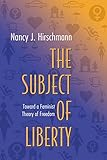The Subject of Liberty : Toward a Feminist Theory of Freedom / Nancy J. Hirschmann.
Material type: TextPublisher: Princeton, NJ : Princeton University Press, [2009]Copyright date: ©2003Edition: Course BookDescription: 1 online resource (312 p.)Content type:
TextPublisher: Princeton, NJ : Princeton University Press, [2009]Copyright date: ©2003Edition: Course BookDescription: 1 online resource (312 p.)Content type: - 9780691096254
- 9781400825363
- 305.42 320.011
- HD62.5
- online - DeGruyter
- Issued also in print.
| Item type | Current library | Call number | URL | Status | Notes | Barcode | |
|---|---|---|---|---|---|---|---|
 eBook
eBook
|
Biblioteca "Angelicum" Pont. Univ. S.Tommaso d'Aquino Nuvola online | online - DeGruyter (Browse shelf(Opens below)) | Online access | Not for loan (Accesso limitato) | Accesso per gli utenti autorizzati / Access for authorized users | (dgr)9781400825363 |
Frontmatter -- CONTENTS -- PREFACE -- ACKNOWLEDGMENTS -- Chapter One. INTRODUCTION -- Chapter Two. THE SOCIAL CONSTRUCTION OF FREEDOM IN HISTORICAL PERSPECTIVE -- Chapter Three. FEMINISM AND FREEDOM: THE SOCIAL CONSTRUCTION PARADOX -- Chapter Four. INTERNAL AND EXTERNAL RESTRAINT: THE CASE OF BATTERED WOMEN -- Chapter Five. WELFARE AS A PROBLEM FOR FREEDOM THEORY -- Chapter Six. EASTERN VEILING, WESTERN FREEDOM? -- Chapter Seven. TOWARD A FEMINIST THEORY OF FREEDOM -- NOTES -- NAME INDEX -- SUBJECT INDEX
restricted access online access with authorization star
http://purl.org/coar/access_right/c_16ec
This book reconsiders the dominant Western understandings of freedom through the lens of women's real-life experiences of domestic violence, welfare, and Islamic veiling. Nancy Hirschmann argues that the typical approach to freedom found in political philosophy severely reduces the concept's complexity, which is more fully revealed by taking such practical issues into account. Hirschmann begins by arguing that the dominant Western understanding of freedom does not provide a conceptual vocabulary for accurately characterizing women's experiences. Often, free choice is assumed when women are in fact coerced--as when a battered woman who stays with her abuser out of fear or economic necessity is said to make this choice because it must not be so bad--and coercion is assumed when free choices are made--such as when Westerners assume that all veiled women are oppressed, even though many Islamic women view veiling as an important symbol of cultural identity. Understanding the contexts in which choices arise and are made is central to understanding that freedom is socially constructed through systems of power such as patriarchy, capitalism, and race privilege. Social norms, practices, and language set the conditions within which choices are made, determine what options are available, and shape our individual subjectivity, desires, and self-understandings. Attending to the ways in which contexts construct us as "subjects" of liberty, Hirschmann argues, provides a firmer empirical and theoretical footing for understanding what freedom means and entails politically, intellectually, and socially.
Issued also in print.
Mode of access: Internet via World Wide Web.
In English.
Description based on online resource; title from PDF title page (publisher's Web site, viewed 30. Aug 2021)


